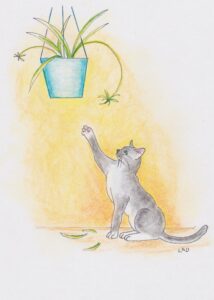Blame it on my somewhat monastic lifestyle, but I tend to get involved in the lives and deaths of the creatures in my house, such as the tiny ants whose processions I spritz with soapy water as they flee in desperation, then shrivel into dots and die. They look to me like little black-clad civilians running for shelter from a bombing raid, and I can almost hear their little cries of terror and pain. Thanks to E.O. Wilson and others we now know that bugs feel pain, and if so, why not terror, and even despair?
As for plants, it was revealed years ago that little old ladies who chatted with their houseplants weren’t crazy after all: their plants flourished, whether because of the CO2 their owners breathed on them, or because of the sound vibrations, or simply because they liked the attention. A few decades later came the reports from scientists who eavesdropped on the conversations that trees have with each other, via the mycelium, warning of dangers and being solicitous of their offspring.
My cat Telemann is addicted to spider plants, which I grow for him. Every morning I cut him a three-inch piece of a spider plant leaf, which he devours. And every morning I wonder how my spider plants feel about being amputated for the pleasure of a cat. A couple of weeks ago, the old geranium wintering in my sunroom sprang a new shoot—bright green and fuzzy, thick as my little finger, and practically oozing life force and joie de vivre. But it looked like a vegetative shoot, one that would grow taller and taller, putting out leaves but no flowers and taking resources from other parts of the plant. I watched it for days, hoping it would put out a flower bud, but it just kept reaching for the sky. I knew what I had to do, but I hesitated. Then one morning I took a deep breath, picked up my pruning shears and cut it in half. And for a moment I almost thought I heard the plant complain.
Then a friend sent me this article about a study showing that plants make distress noises when they are stressed or cut. Just how is a caring, empathetic person supposed to deal with this news?
It seems like every day somebody publishes a paper detailing the amazing emotions and capabilities of animals that were long believed to function by mere instinct. Bees recognize their keepers! Octopuses use tools! Monkeys have a sense of fairness! And now it turns out that plants cry out when they are deprived of water or have their limbs chopped off. Back when I had apple trees, I loved to prune them in the early spring, cutting off suckers and branches that were growing at the wrong angle or that, once they leafed out, would prevent sunlight from reaching the fruit. I thought my trees enjoyed being pruned. But having read the article, I wonder if that first pleasure of the gardening year was accompanied by a to me inaudible chorus of wails. I’ve already stopped eating animals basically because I feel sorry for them. Will I now, whenever I eat broccoli, be haunted by the moans of the mother plant as her florets were sheared off?
We live in a sentient universe, hemmed in on all sides by beings visible and invisible, mobile and rooted, who mourn and rejoice, suffer and prosper, and want desperately to survive. It seems that we cannot live without causing pain to some creature. So what is a vegetarian to do?
I don’t plan to give up food, but I will strive to embrace the knowledge that on this planet all life is predicated on death, and that I in turn will one day be consumed by creatures in quest of dinner. There is justice and beauty in the thought of my molecules dissipating and intermingling with the molecules of other beings in the dirt and leaf litter of a wood somewhere (I am hoping for an eco burial). It’s less rosy than a vision of harp-playing angels sitting on clouds, but the idea of giving my body back to the earth comforts my gardener’s soul.



4 Responses
I hope that time is far into the future, because your narratives are nourishment desperately needed in times like these today.
Thank you for reading, Mike!
I admit I am wondering where you would like to be ecoburied!
There are a couple of places in Vermont that I keep meaning to investigate, but for some reason I’ve been putting it off…